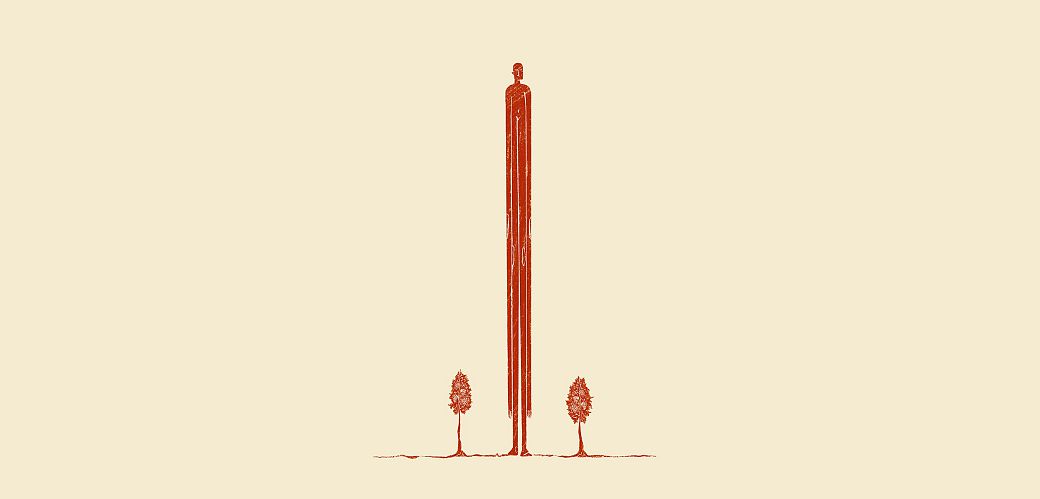We speak of the right measure, of moderation – and also mean fullness: a life of happiness, embracing the whole being.
The right measure?
The fundamental idea of biodynamics is thousands of years old; it is one of the four cardinal virtues and more relevant today than ever before – moderation.
The mysterious oracle in Delphi is the source of a saying which, in contrast to other auguries that are usually difficult to decipher, sounds simple enough: “Nothing in excess”. This short phrase, which is both a statement and an appeal, was meant to help human beings correctly assess their relationship to the gods (to nature and the Creation) and thus their position in the cosmic order. However, a few of the ancient myths suffice to illustrate that humankind has at all times struggled to find the right measure, and for millennia the apparently simple phrase “Nothing in excess” has been at the heart of the fundamental and ever-present question of how to live the right life, a life of moderation.
Since the beginnings of ethics, i.e. systematic reflection on the morally “right” course of action for mankind, philosophers have given thought to the concept of moderation. In Plato, temperance, which includes the right measure, was one of the four cardinal virtues (along with fortitude, justice and prudence). In the 19th century, however, temperance (like virtue ethics in general) ceased to play an important role in philosophy: science, and technological and economic progress suggested infinite possibilities for “modern” humankind. Few people asked questions about the limits of their actions – and if they did, few wanted to hear about it.
The fact that, prompted by the clearly visible signs of climate change, we are now debating the limits of growth and thus of human activity shows that, once again, the core issue is to find the “right measure” – in our relationship with nature and with one another. And this is one of the main reasons why, almost 20 years ago, we decided to put Manincor and our approach to wine growing on a new footing, one that is decidedly more nature-friendly.
What does this “right measure” this “moderation” mean in concrete terms in Manincor? Where are the opportunities to do less, to take less, to manage natural resources in such a way that they set processes in motion and regulate forces of their own accord?

The biodynamic path.
We speak of the right measure, of moderation – and also mean fullness: a life of happiness, embracing the whole being. The path begins with contentment, the ability to see what is and respect it. In our case, it begins with the question of how content we are to be able to live and work here on Lake Caldaro with a view of its waters. Living here in this cultural landscape, amidst the fruits of nature, is itself a daily source of inspiration. This in turn gives rise to the desire to manage the land so as to create a symbiosis between man and nature – and also to be able to pass on something healthy and intact to the next generation.
The path leads deep into the soil, because the fertility and life of the soil are essential for the vines and grapes to be well nourished. Seeding covercrop between the rows of vines and the use of our own compost improve the humus layer – so that the plants can achieve the right balance. Our role is to diagnose the health of our vineyards and, wherever possible, let nature take its course.
The stong point of biodynamics is the ability to stimulate plant health through homeopathic doses of plant extracts in the rhythm of nature. Infusions of nettle, chamomile and horsetail strengthen the plants. In the cycle of the seasons and times of the day, and in harmony with the phases of the moon, preparations of horn manure and horn silica are sprayed. They act as a catalyst and ensure that the vineyards remain in balance with all the life in them.
This harmony in the growth of the vines has a direct impact on the quality of the grapes. The skins of our grapes are robust and intensely flavorful as evidenced by the elegance and finesse of our wines: From La Manina to Lieben Aich, from Keil to Castel Campan – they all bear the same hallmark. They give pleasure, and – in the right measure – stand for first-class enjoyment in the glass and are wonderful companions to a meal.
Valuable assistance is also provided by our animals: the sheep and free-range chickens, insects and bees, songbirds and birds of prey that live in the vineyards. They, too, are an important element in the natural cycles and an organic tool in their support.

Moderation in construction.
Every building is an intervention in the landscape. For the construction of the new wine cellar in Manincor in 2004, a guiding principle was the restrained use of resources and a form of architecture targeted at permanence and sustainability. The layout is designed to keep distances in the wine making process short and efficient. Where possible, use is made of the natural force of gravity. A structure with a double skin is the key to good temperature regulation, which is so important for a wine cellar. Energy is produced with the help of a wood chip burner, which is fired with wood from the estate’s own trees. The wine cellar is located underground and is covered with living soil and a vineyard. It was designed to preserve the historic fabric of the 400-year-old manor house as well as the surrounding landscape.
Today the “new” wine cellar is part of the Manincor fabric that defines us and life and the work here. More than a mere place of transit for our wines, it is an intimate union of tradition and progress in moderation. The deep scars of construction have closed. They remain visible – and beautiful, like the gold-filled cracks in the Japanese art of repairing broken pottery.

The art of reduction.
As a biodynamic winery, we work on the principle of spontaneous fermentation. In the winemaking process, we make use of gravity for gentle treatment of the grapes. The catalyst for fermentation is provided by the natural yeasts on the grape skins. Our experience helps us to provide individual support and gentle guidance for this process.
It is of course the wine that is close to our hearts and should give pleasure in the glass and then to the palate. But the bottle, label and cork play a role, too – as a prelude to this pleasure. And these are things we also consider in the light of our overarching goal of reduction. The tin capsules on the bottles, for example, have already been replaced with paper banderoles, and we are currently looking at ways of reducing the weight of our wine bottles.
Reduction and the primacy of natural processes are the key principles of our work. And yet there are areas where one has to step in and do more instead of less in the interest of contentment and coexistence in moderation: In running Manincor as a workplace, the focus is on thoughtful consideration in our dealings with one another. Those who work here are integrated into a community and viewed holistically as human beings with all their talents and needs.
The same attitude determines how we define success for the winery as a business. It is not about permanent growth, but about continuously improving the quality of the work, the grapes, the soil, the teamwork and – of course – the wine.
Finally, let us return to philosophy and to one of the rare examples from the recent past in which the concept of the right measure was at the center of reflection on what it means to be human – to Albert Camus. Although one would hardly expect it of this Nobel Prize winner for literature, who died much too early in 1960 and is known above all for his ideas on the absurd, Camus saw nature as an escape route from this absurd world, in which there is no definitive truth and no ultimate meaning of existence. “Nature … contrasts her calm skies and her reasons with the madness of men,” he writes in “Helen’s Exile”, one of his famous Mediterranean essays. – It is no coincidence that Camus makes explicit reference to the thinking of the ancients, as mentioned at the beginning, and to the ethics of moderation, which is a part of it. Through a philosophy turned towards the sensual life, he also reminds us that the saying “Nothing in excess” from the oracle at Delphi is closely linked with another one: “Know thyself”.
It is only a small step from a life of moderation inspired by experiencing and observing nature to self-knowledge: As in a mirror into which we look every day, we can also recognize ourselves in nature and search there over and over again for our right measure – and find it in the great plan of nature as well as in the little details of human interaction.